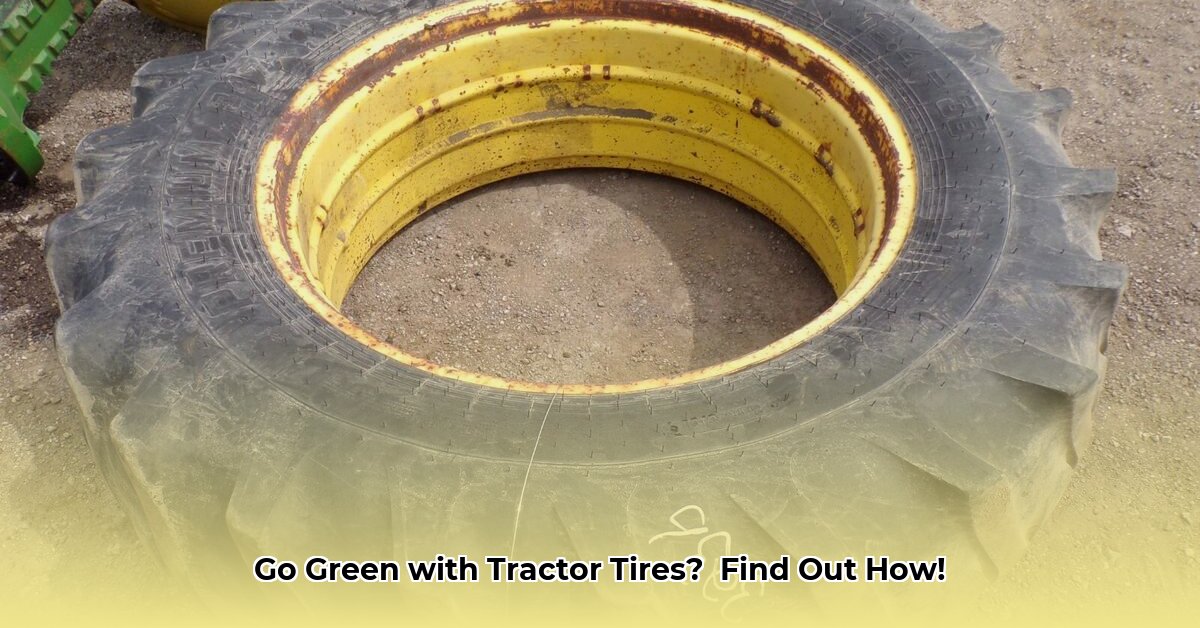
Choosing the right tires for your 18.4-38 tractor significantly impacts both your bottom line and the environment. This comprehensive guide helps you navigate the world of sustainable tire options, ensuring you make informed decisions that benefit your farm and the planet. We'll cover everything from understanding tire specifications to responsible disposal, empowering you to cultivate a greener and more profitable farming future. For more on tractor maintenance, check out these helpful resources.
Understanding Tire Specifications for Sustainability
What truly defines a "sustainable" tractor tire? It's not just a marketing buzzword; it encompasses several key factors:
Rolling Resistance: Think of it like pushing a shopping cart – a smoother-rolling cart requires less effort. Similarly, tires with lower rolling resistance require less power from your tractor, translating directly into fuel savings. Lower rolling resistance means less fuel burned and lower operating costs. This is a critical factor in long-term sustainability.
Tread Life: A longer-lasting tire means fewer replacements, reducing waste and lowering your overall tire expenses. Look for tires with durable tread patterns and high-quality rubber compounds designed for extended wear. This reduces landfill burden and saves you money in the long run.
Rubber Compound Composition: Increasingly, sustainable tire manufacturers incorporate recycled materials and even bio-based components into their rubber. This reduces the environmental impact of tire production. Check manufacturers' specifications for details on their sustainable sourcing practices. The impact of bio-based materials on tire longevity is an area of ongoing research.
Tire Construction: Radial tires often provide better fuel efficiency and longer tread life than bias-ply tires. However, bias-ply tires might be more suitable for rocky terrains. This decision depends on your specific farming conditions.
Choosing Sustainable 18.4-38 Tractor Tires: A Step-by-Step Guide
Selecting the right sustainable tires involves a methodical approach:
Assess Your Farming Needs: Before diving into tire specifications, analyze your farm's unique characteristics. What types of soil do you primarily work with? What are your typical workloads? Heavy clay soils, for example, require tires with different characteristics than sandy loam. This assessment ensures you select tires optimized for your specific operations.
Prioritize Sustainability Features: Create a ranked list of your top priorities. Fuel efficiency? Tire longevity? Reduced soil compaction? Use of recycled materials? Weighing these factors helps you objectively compare different tire options.
Compare Tire Specifications: Don't rely solely on marketing materials. Deep-dive into manufacturers' data sheets, carefully comparing rolling resistance values (lower is better!), tread depth (deeper usually means more durable), and rubber compound information. Thorough comparison is critical for making informed choices.
Calculate Lifecycle Costs: The initial purchase price isn't the only factor. Evaluate the total cost of ownership, considering fuel savings throughout the tire's lifespan and potential disposal costs. A slightly higher upfront cost often translates into significant long-term savings.
Source Your Tires Responsibly: Choose reputable suppliers committed to sustainability. Inquire about their recycling programs and their commitment to responsible manufacturing practices. This proactive approach supports environmentally conscious businesses.
Practice Proper Tire Management: Maintaining correct tire pressure is crucial. Underinflation leads to premature wear and increased soil compaction. Regular tire rotation ensures even wear, extending the tire's lifespan. These practices help maximize your investment.
Advocate for Change: Support policies and initiatives promoting sustainable tire manufacturing and recycling. Your voice matters in shaping a greener agricultural future. Support organizations working towards sustainable agricultural practices.
Tire Disposal and Recycling: Responsible End-of-Life Management
Improper tire disposal contributes significantly to environmental pollution and landfill waste. Here's how to handle tire disposal responsibly:
Tire Recycling Programs: Many tire manufacturers and retailers participate in recycling programs. Contact your local waste management authority or tire dealer to learn about options in your area. Proper recycling diverts waste from landfills.
Retreading: Extending the life of your tires through retreading is an environmentally sound practice. Retreading significantly reduces waste and lowers your long-term costs. Consider this option when your tires are still structurally sound.
Financial Implications: Long-Term Cost Savings
While sustainable tires may have a higher upfront cost, the long-term savings from reduced fuel consumption and increased lifespan often outweigh the initial investment. This makes sustainable tires a fiscally responsible choice for the long haul.
Resources for Further Information
Consult agricultural machinery manufacturers' websites, independent tire testing organizations, and agricultural publications for detailed specifications and comparisons. These resources offer in-depth information to support your decision-making process.
Key Takeaways: Making Sustainable Choices
Sustainability is multifaceted: Consider rolling resistance, tire life, rubber composition, and responsible disposal when making your decision.
Your farming practices influence tire choice: Match the tread pattern to your soil type and operations to maximize efficiency.
Long-term costs are critical: Factor in fuel savings, tire lifespan, and disposal options when comparing options.
Responsible sourcing is essential: Choose suppliers committed to sustainability and transparent manufacturing processes.
Proper tire management maximizes lifespan and performance: Maintain correct pressure and rotate tires regularly for optimal performance and longevity.
By adopting these practices, you're not just choosing tires; you're investing in a more sustainable and profitable future for your farm and the environment.